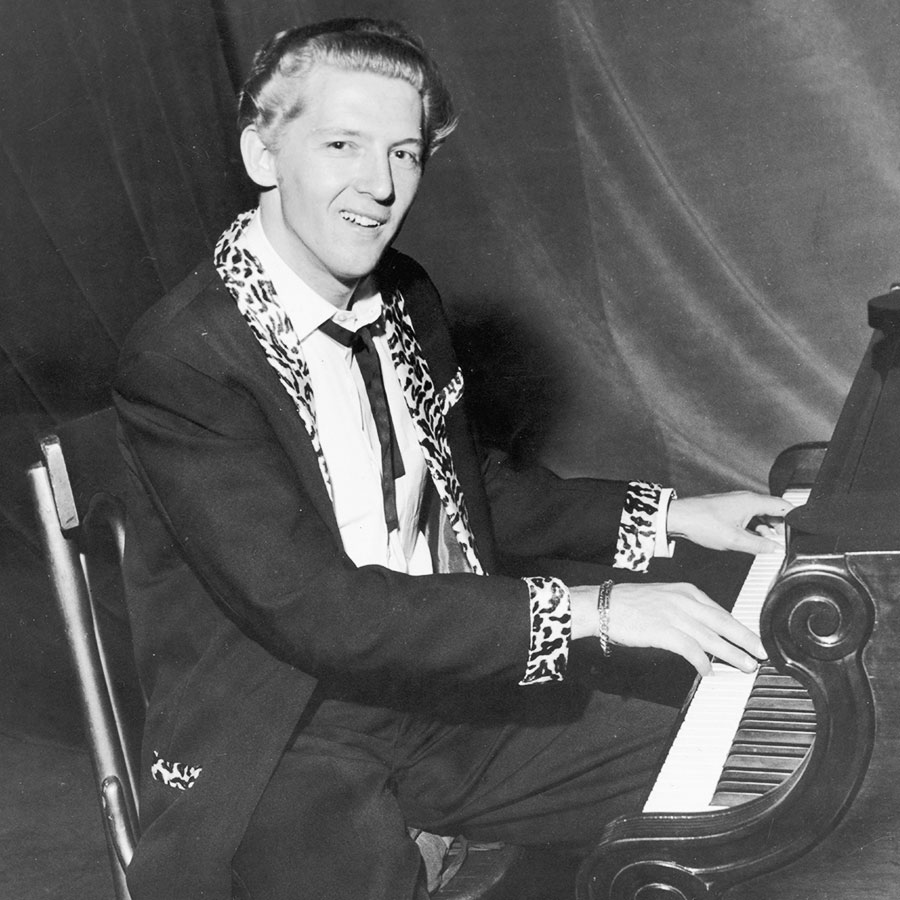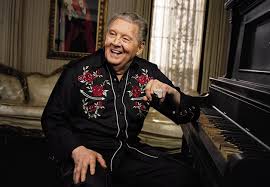
Jerry Lee Lewis (September 29, 1935 – October 28, 2022) was an American pianist, singer and songwriter, nicknamed “The Killer” and was described as “rock ‘n’ roll’s first great wild man”.
Jerry Lee Lewis was born on September 29, 1935, to Elmo Kidd Lewis Sr. and Mary “Mamie” Herron Lewis in Ferriday, Louisiana. He grew up in an impoverished farming family in Eastern Louisiana and began playing piano in his youth, with two of his cousins, Mickey Gilley (later a popular country music singer) and Jimmy Swaggart (later a popular televangelist). His parents mortgaged their farm to buy him a piano.
Jerry Lee Lewis was influenced by a piano-playing older cousin, Carl McVoy (who later recorded with Bill Black’s Combo), the radio, and the sounds from Haney’s Big House, a black juke joint across the tracks.
On November 19, 1949, Jerry Lee Lewis made his first public performance of his career, playing with a country and western band at a car dealership in Ferriday. The hit of his set was his performance of R&B artist Stick McGhee’s “Drinkin’ Wine, Spo-Dee-O-Dee”.
His mother enrolled him at the Southwest Bible Institute in Waxahachie, Texas, so that he could sing evangelical songs exclusively. When Lewis daringly played a boogie-woogie rendition of “My God Is Real” at a church assembly, it ended his association with the school the same night. Pearry Green, then president of the student body, related how during a talent show Lewis played some “worldly” music.
The next morning, the dean of the school called Lewis and Green into his office to expel them. After that incident, he went home and started playing at clubs in and around Ferriday and Natchez, Mississippi, becoming part of the burgeoning new rock and roll sound.
Around 1955, Jerry Lee Lewis travelled to Nashville, where he played in clubs and attempted to build interest, but was turned down by the Grand Ole Opry, as he was already at the Louisiana Hayride country stage and radio show in Shreveport.
A pioneer of rock ‘n’ roll and rockabilly music, Jerry Lee Lewis’s breakthrough came in the mid-1950s when he signed with Sun Records in Memphis, Tennessee, a label that was home to other rock ‘n’ roll legends like Elvis Presley, Johnny Cash, and Carl Perkins. In 1957, his single “Whole Lotta Shakin’ Goin’ On” catapulted him to stardom. His energetic stage presence, charismatic persona, and wild piano-playing style made him an instant sensation. Lewis’s success was not limited to the United States; his fame extended across the Atlantic, where he gained a devoted following in the UK.
“Crazy Arms” sold 300,000 copies in the Southern United States, but it was his 1957 hit “Whole Lotta Shakin’ Goin’ On” that shot Jerry Lee Lewis to worldwide fame. He followed this with the major hits “Great Balls of Fire”, “Breathless”, and “High School Confidential”.
.
.
While his musical career was soaring, Lewis faced significant personal and professional setbacks. The most notorious of these was his marriage to his 13-year-old cousin once removed, Myra Gale Brown, when he was 22. The scandal led to a public outcry, and Lewis’s popularity took a hit. Radio stations banned his music, and concert bookings dwindled. Despite the backlash, Lewis continued to perform and record, proving his resilience in the face of adversity.
The 1960s and 1970s saw a resurgence of interest in Lewis’s music, particularly in Europe. He embarked on successful tours, gaining a new fan base. He also received recognition for his contributions to music, including inductions into the Rock and Roll Hall of Fame and the Louisiana Music Hall of Fame. Despite his tumultuous personal life, Lewis’s dedication to his craft and his ability to captivate audiences endured.
While Lewis experienced numerous highs in his career, he also faced profound personal tragedies. In 1962, a fire at his home claimed the lives of his young son and wife. The incident left Lewis devastated, and his subsequent struggles with substance abuse further compounded his difficulties. These personal trials added layers to his complex persona and contributed to his legendary status as a tormented artist.
On September 29, 1976 Jerry Lee Lewis’s 41st birthday, he fired a .357 Magnum at a Coke bottle in his bedroom. The bullet ricocheted and accidentally hit bassist Butch Owens in the chest but luckily he survived.
On November 23, 1976, Jerry Lee Lewis was arrested outside Elvis Presley’s Graceland home for allegedly intending to shoot him.
In Rick Bragg’s 2014 authorized biography, Jerry Lee Lewis: His Own Story, Lewis said that the reclusive Presley had been trying to reach him and finally did on November 23, imploring him to “come out to the house.” Lewis replied that he would if he had time, but that he was busy trying to get his father, Elmo, out of jail in Tunica for driving under the influence. Later that night, Lewis was at a Memphis nightclub called the Vapors drinking champagne when he was given a gun. Lewis suddenly remembered that Elvis wanted to see him and, climbing aboard his new
Lincoln Continental with the loaded pistol on the dash and a bottle of champagne under his arm, tore off for Graceland. Just before three o’clock in the morning, Lewis accidentally smashed into the famous Graceland gates.
Presley’s astonished cousin Harold Lloyd was manning the gate and watched Lewis attempt to hurl the champagne bottle out the car window, not realizing the window was rolled up, smashing both. Bragg reports that Lewis denies ever intending to do Presley harm, that the two were friends, but “Elvis, watching on the closed-circuit television, told guards to call the police.
The Memphis police found the gun in the car and put Lewis, protesting, hollering, threatening them, away in handcuffs.” Lewis said, “The cops asked Elvis, ‘What do you want us to do? And Elvis told ’em, ‘Lock him up.’ That hurt my feelings. To be scared of me – knowin’ me the way he did – was ridiculous.” Lewis was charged with carrying a pistol and public drunkenness. Released on a $250 bond, his defiant mugshot was wired around the world
.
.
As the years went on, Jerry Lee Lewis continued to perform and record music, maintaining a dedicated fan base. His live shows, characterized by his electrifying energy and timeless hits, remained a testament to his enduring talent. However, health issues began to take a toll on his performances, and he was eventually diagnosed with various medical conditions that impacted his ability to tour.
Jerry Lee Lewis‘s impact on the music industry is immeasurable. His fusion of rhythm and blues, country, and gospel created a unique sound that helped shape the rock ‘n’ roll genre. His piano-playing style, characterized by energetic and flamboyant performances, influenced countless artists, including Elton John, Billy Joel, and Little Richard. Even as his chart-topping hits waned, his influence on subsequent generations of musicians remained undeniable.
Jerry Lee Lewis’s life was a rollercoaster of highs and lows, successes and setbacks, fame and controversy. From his humble beginnings in Louisiana to becoming a rock ‘n’ roll icon, his journey was one of resilience, determination, and undeniable talent. His influence on music cannot be overstated, and his legacy lives on through his timeless recordings and the artists he inspired. Jerry Lee Lewis will forever be remembered as a true pioneer of rock ‘n’ roll, a man whose music will continue to resonate for generations to come.
.

.
Jerry Lee Lewis had a minor stroke in Memphis on February 28, 2019 and had to cancel several appearances.
Jerry Lee Lewis died at his home in Nesbit, Mississippi on October 28, 2022, at the age of 87.
Check out Jerry Lee Lewis on Amazon
If you found this article interesting please share it with your friends and family, and why not check out some of our other articles on Musicians who died in 2022.


Pingback: The Man in Black, Johnny Cash died September 12, 2003 - Dead Musicians